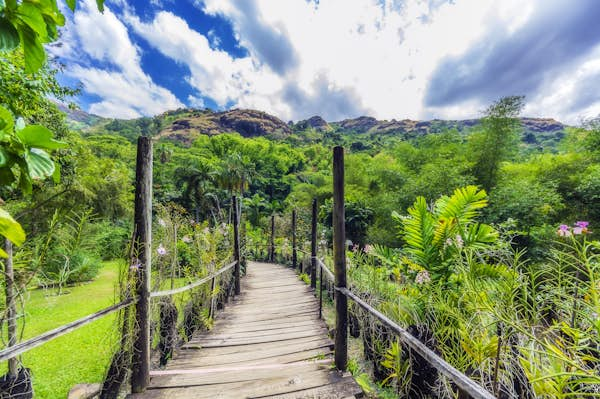Challenge Fiji. Demand more than pristine beaches and high-class resorts. Search for more than a “tropical paradise” and sun-drenched lazy days. Look for outdoor adventures of the Class IV variety or in the murky waters where eels hide. Put these islands to the test and find out (rather quickly) they’re ready for it. Here’s a list of some off-beach activities to get your blood flowing. But don’t fret, the beach will still be there when you return.

Hop on a boat
If you love those ocean views but aren’t quite ready to get your feet wet, go boating. Maybe an adventurous deep-sea fishing charter out of Nadi or a more relaxed day-long island-exploring excursion on a 15-meter sailing yacht, there are a host of options.
Some resorts, like the Nanuku Auberge Resort in Pacific Harbor, offer sailing lessons with an easy, entry-level sailing vessel – the Hobie Cat, a small catamaran with room for a small group of passengers or for one beginner to maneuver back and forth between port and starboard, learning how to tack the jib, adjust the line, steer the rudder and repeat.
Deep-sea diving adventures
Ready to dive in? The turquoise tropical waters surrounding Fiji are inviting, and in fact, to some vacationers, are the raison d’être to visit Fiji in the first place. The easiest way is to don a snorkel, mask and fins and explore some of the best coral reefs in the Pacific.
In fact, the Cakaulevu Reef (aka the Fiji Barrier Reef) off the northern coast of Fiji’s Vanua Levu is the third-longest continuous coral reef in the world (200 km/120 miles long) and supports a multitude of life in and out of the water. Parrotfish may be lurking around Fiji’s coral looking for breakfast, but nothing compares to observing a local spearfisherman on the prowl for dinner.
The reefs that are further out from shore require a boat, but luckily there are more than enough snorkel tours to choose from if you’re staying by the coast. Itching for a dorsal fin-fueled adrenaline rush? Some operators offer snorkeling amidst reef sharks – in open water, sans cages.
If you want to dive deeper, Fiji is a major scuba diving destination, with plenty of PADI-certified outfitters who can guide you through the country’s world-class dive spots, including the Great Astrolabe Reef and sites in the Somosomo Strait

Conquer the rapids
You need not be in the Pacific Ocean for wet and wild adventure; inland on the main island of Viti Levu is the Navua River, which snakes its way from Mount Gordon and the southern mountains, through gorges and rainforest, exiting at the south coast. The Upper Navua is the stage for a thrilling day-trip over Class IV rapids (the range of difficulty depends on the season) and is an adventure regardless of water levels.
Rivers Fiji is the premier outfitter to guide you through the whitewater, with guides to support rafters of all skill levels. For those who lack any paddling skills (or lack the will to learn any), there are motor-powered jet boat tours up the Navua or Sigatoka River.
Related article: Fiji for first-timers: how to choose an island
Hit the hiking trails
The Lower Navua River is a good entry point to good, lesser-known hiking trails in the Pacific Harbor/Navua area, but it’s best to go with a local guide who knows where the trailheads and, on hot days, local swimming holes are. More defined hiking trails are found in the national parks, like Sigatoka Sand Dunes National Park on Viti Levu, Fiji’s first nationally declared and protected natural site.
Two marked trails (one t0 two hours in duration) bring you to views of the dunes, some nearly 200 feet (60 meters) in height. Bouma National Heritage Park on the island of Taveuni – Fiji’s “Garden Island” – has several hiking trails leading through the jungle to waterfalls.
Koroyanitu Naitonal Heritage Park has hiking trails around Mount Batilamu (the Sleeping Giant), which is a challenge should you decide to summit it. For more of a leisurely stroll, check out the Garden of the Sleeping Giant, an impressive botanical estate with easily accessible boardwalks.

Forage for food
If you’re hiking through the rainforest with a local guide, there’s a chance he may stop off and forage for wild ferns to take home. Not for decorative purposes, these leaves are known locally as ota, and are staple greens in Fijian cuisine. Locals also live off the land when it comes to proteins; hunting for wild boar is common, but not necessarily a safe activity to participate in as a visitor.
However, Nanuku Auberge Resort offers eel hunting excursions with a local family, in which you patiently wade around muddy creeks with nets, waiting for river eels to rise from the ground. Nanuku prides itself on local active experiences and offers other foraging activities, from mangrove crabbing to learning how to husk a coconut.

Visit the local market
For those ill-equipped to forage, there’s always the local market. Nadi and Suva are bigger towns and therefore have larger farmers markets, though small towns like Navua have them as well. Among the aisles, you’ll find fresh vegetables like Fijian staple rourou (taro leaves) or spicy bongo peppers.
One particularly delicious local delicacy is sea grapes not to be confused with the sweet Caribbean kind. Fijian sea grapes are a type of seaweed that resembles tiny bunches of green grapes. Known as “green caviar,” sea grapes taste briny like the ocean, with a texture similar to slightly crunchy fish roe.
Local markets will also have roots of the kava plant used to make the quintessential Fijian beverage, kava. It’s a bitter, earthy concoction with numbing and sedative properties, used traditionally during tribal ceremonies amongst the male elders. Today, it has become a co-ed social drink for locals and visitors alike, for relaxing nights back by the beach.
